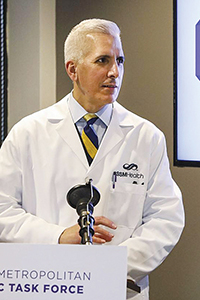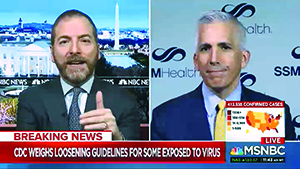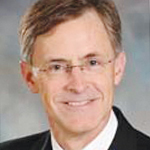ST. LOUIS — It was his proposal that the major health systems tackle the coronavirus pandemic with military precision that Dr. Alexander Garza said landed him in the role of incident commander of the St. Louis Metropolitan Pandemic Task Force.

Dr. Alexander Garza of SSM Health prepares to provide a media briefing on behalf of the St. Louis Metropolitan Pandemic Task Force in April. He is the group's incident commander.
"We were all sitting around the Mercy boardroom and sort of throwing all these thoughts out there, and I, maybe mistakenly, said, 'You know, there's a way we can do this,'" recalled Garza, a physician leader at St. Louis-based SSM Health. At the table with him on that February day were representatives from the St. Louis region's three other anchor health care providers: BJC HealthCare, Mercy and St. Luke's Hospital. COVID-19 was being reported in New York and Washington state and had started its sweep across the globe.
Garza proposed using a military decision-making process to defend against COVID: anticipate and define the problems, set end goals and lay out steps to get there. Garza said it was clear to him that what was needed was a unified effort to get all of the cogs and gears moving in sync.
The group agreed to pool their efforts and mount a unified offense coordinated with government and public health leaders. They created the task force, tapping Garza as its leader.

Dr. Alexander Garza, right, of SSM Health is interviewed by Chuck Todd of NBC News. Garza leads the pandemic response by major health care providers in the St. Louis region.
"They said, 'OK, you're our guy,'" Garza recalled. "I was like, 'Wait a minute, I merely offer suggestions.' But I thought, we need to have a single voice leading this, and a single sort of identified point to make this all happen. So, they asked me if I would do it, and I said of course I would."
Meet the press
Since early April, Garza has overseen the sharing of best practices, data and resources among the health systems, and he's been the public face of the pandemic response in the greater St. Louis area. His thrice-weekly media briefings — streamed live on Facebook and often on local news websites — have propelled him into regional celebrity status as a voice of reason.
Garza, 53, said he hopes his briefings are keeping the public informed of the pandemic's human toll and educating people on the importance of social distancing and masking to reduce the infection risk for themselves and others.

Dunagan
The task force has its roots in a brief email Garza got from Dr. Clay Dunagan asking to talk about the pandemic. Dunagan, BJC HealthCare's chief clinical officer, is that system's representative on the task force. He said Garza has been nothing short of spectacular as its leader.
"He's unflappable," Dunagan said. "He's very smart and extremely committed and the guy is just really courageous. He will lean right in even when he's facing tough resistance, but he always does it in a very respectful and kind way. I think he has that great combination of being extremely effective but also a very nice person to deal with."
Dunagan recalled talking with Garza when Garza was returning to his native St. Louis from working in Washington. "I had a chance to interview him and just knew what an extraordinary background he had," Dunagan said. "At that time, I said, 'You know if we ever have a major disaster in STL, I know who I'm going to call first.' I didn't think I would ever have to do that, but it turned out to be the right time."
The right stuff
Garza is uniquely suited to the moment. A specialist in emergency medicine, he joined the U.S. Army Reserve Medical Corps during his residency. His more than 20 years with the Reserve has included serving a yearlong tour in Operation Iraqi Freedom. He was in charge of a team tasked with rebuilding Iraq's health care system and his work led to various honors, including the Bronze Star, and to his rise to his current rank of colonel. Since 2009, he has served as command surgeon for the Reserve's 352nd Civil Affairs Command (Airborne) based in Fort Meade, Maryland.
He was appointed by President Barack Obama and confirmed by the Senate as chief medical officer and assistant secretary for health affairs with the U.S. Department of Homeland Security, serving in that capacity from 2009 to 2013. Part of that job was monitoring emerging health threats and creating plans to address how a severe pandemic might affect national security. He and his team put together a playbook for pandemic response when the H1N1 virus was spreading. It covered acquiring personal protective equipment and distributing vaccines.
In 2013, he moved to St. Louis with his wife and three sons to become associate dean for public health practice and an associate professor of epidemiology at the Saint Louis University College for Public Health and Social Justice. Five years later, he accepted a position as SSM Health's chief medical officer. In August, he took the newly created job of chief community health officer for SSM Health. He is responsible for deepening the health system's focus on social determinants of health, equity and social justice, as well as supporting its pivot to population health and value-based delivery.
No easy task
"I think the chief community health officer asks how does the health care system interact with the community in order to help the community be more healthy?" Garza said. "And that isn't through just the delivery of health care."
For almost two decades, researchers have been making the case that health care impacts only about 10 – 20% of preventable mortality in the U.S. Health care systems increasingly are recognizing the impact of social factors including educational opportunity, safe housing and streets and the availability of stable, living-wage jobs on health outcomes and longevity.
"I think more and more people are beginning to understand that this is really the only way that we're going to be able to sort of move the population in order to improve their health," Garza said. "It seems so simple, but it's not. It's very difficult work, and it's much more about policy work than it is about access to health care."
The pandemic's long tail
Garza is looking toward the COVID vaccines as the start of the end of the pandemic. But even as the inoculation process was beginning, he saw the crisis as far from its end. "There is going to be a lot of sick people and a lot of death between now and then," he said.
And even if the vaccines bring the pandemic to heel, he warned that its effects on the nation will linger because of the many survivors whose health has been diminished and in some cases wrecked by the virus and because of those, including health care workers, who have been traumatized. "When you get into these situations, you don't think about what is going to be the long-term effects until you're there, but you can see it. It's very plain."
As the pandemic was filling up ICUs in the St. Louis region in early December with no sign of a letup, Garza visited staff in the emergency department and ICUs at SSM Health DePaul Hospital in suburban St. Louis. It was one of the SSM Health facilities with the highest number of COVID patients. A refrigerator truck was parked in the back lot to function as an overflow morgue. Garza offered beleaguered staff his deep gratitude for their courage and sacrifice.
Bully pulpit
On the day of the visit, SSM Health DePaul Hospital had doubled up patients in some of its ICU rooms to make space for more COVID patients and its clinicians were bracing for a spike in admissions because of Thanksgiving travel and gatherings that spread infection.
Garza's presence reassured staff. "He is the calm in the storm," said Dr. Sriram Vissa, SSM Health DePaul Hospital's vice president of medical affairs and chief medical officer. "I've never seen him become angry or emotionally ruffled. I've seen him vulnerable to the tragedy that's going on around us. He has had his moments, as any human would, with tears and that kind of emotional response but not, I would say, emotional swings."
In one of the ICUs, Garza asked Nurse Manager Angelo Lavelle how the staff was holding up amid the relentless surge of COVID patients. "They're tired, I'm not going to lie to you," Lavelle replied.
Hours later, during a task force media briefing, Garza said on average 20 people were dying of COVID each day in the region, three times as many as in the worst days of spring. "As I spoke with our teams at DePaul Hospital today, they were telling me that sometimes they feel hopeless when they see a patient take a turn for the worst, because they've seen it so many times before, that the patient will not be discharged from the hospital," he said.
He then admonished Missouri's governor and other elected officials for not adopting public health measures including mandatory mask rules and safer-at-home policies that have proven effective in other states at checking the spread of the virus. He also urged the public to remain vigilant in following infection precautions.
Speaking to the viewing public, he said: "We are still fighting this battle without all the weapons and tools that we need. Now, I hope that changes, but until it does, you are our best hope that we have to slow the virus and to buy the time that we need."